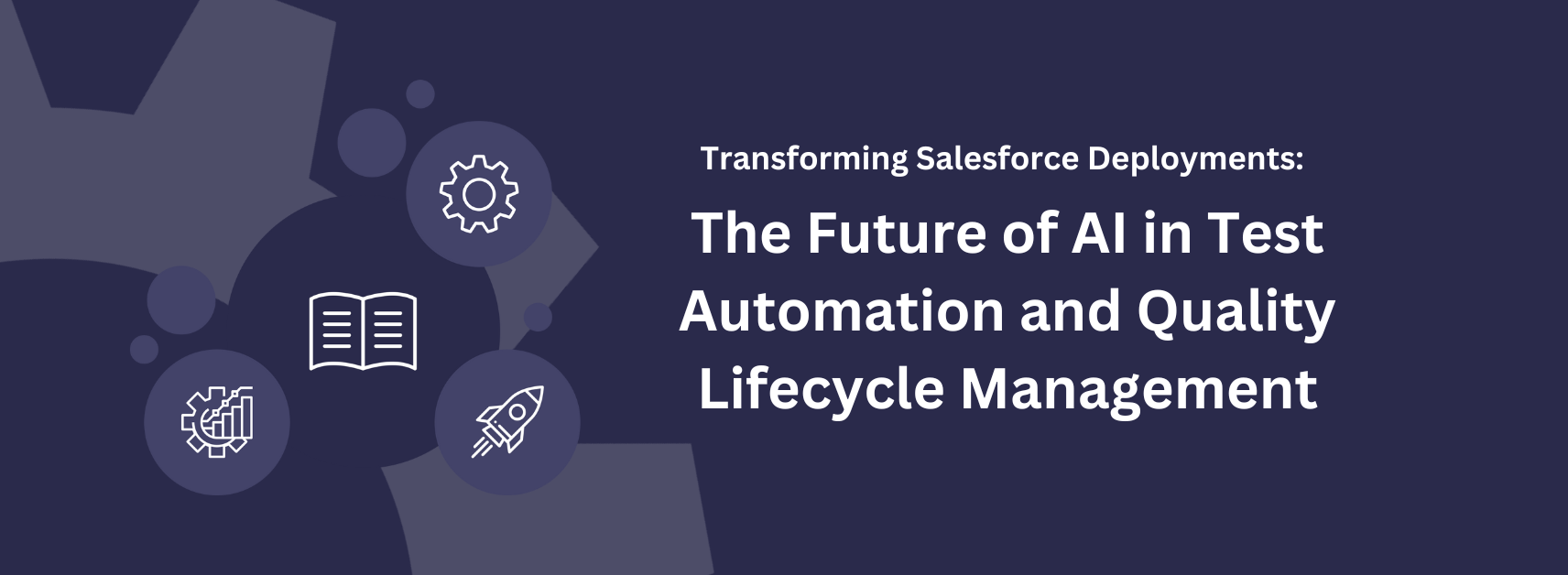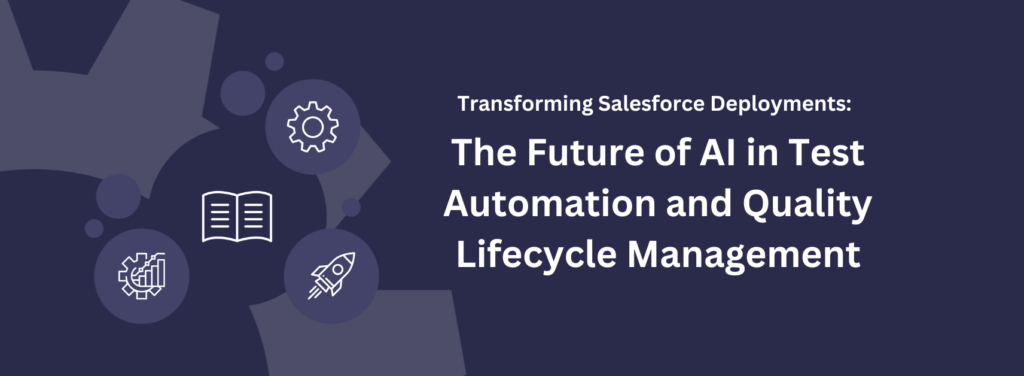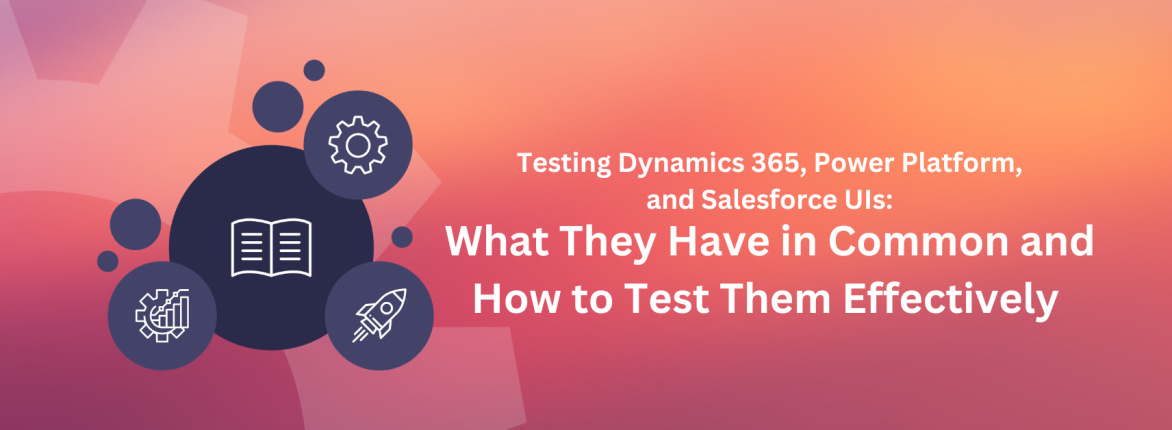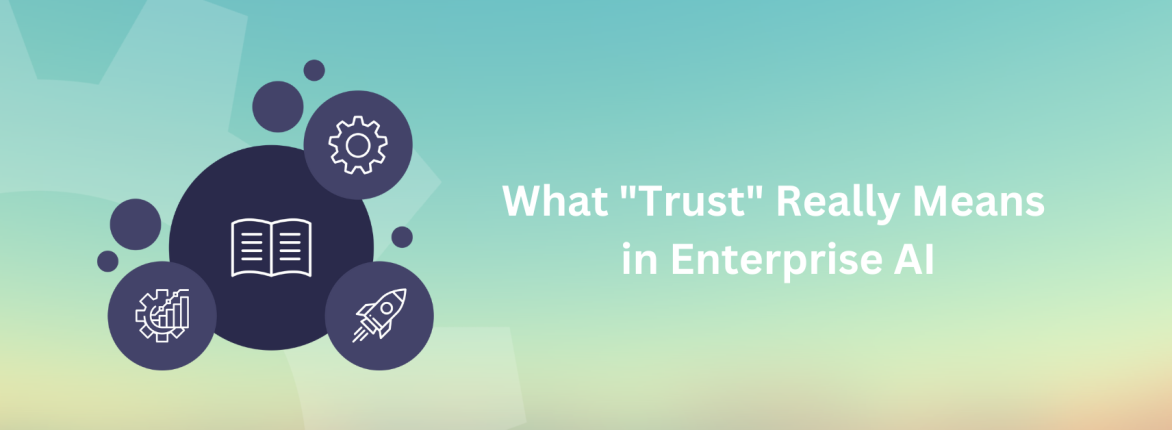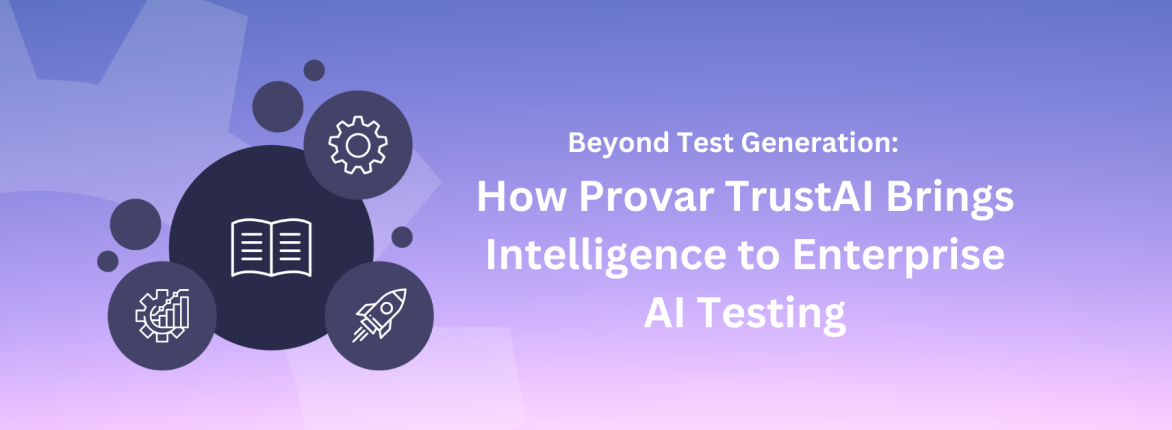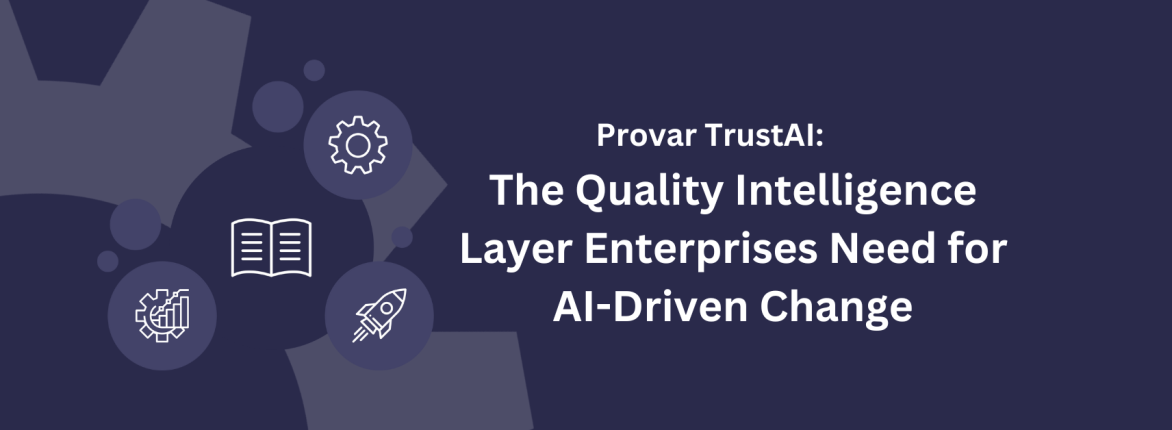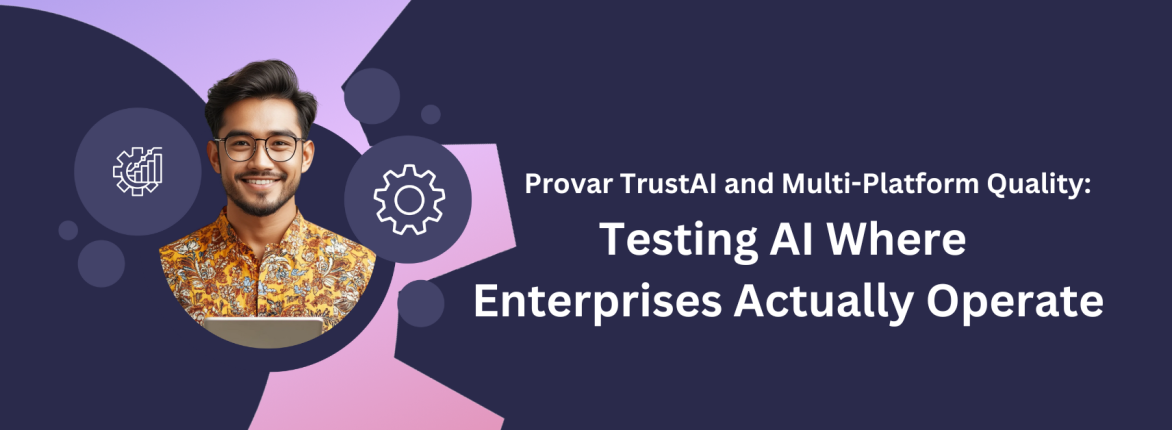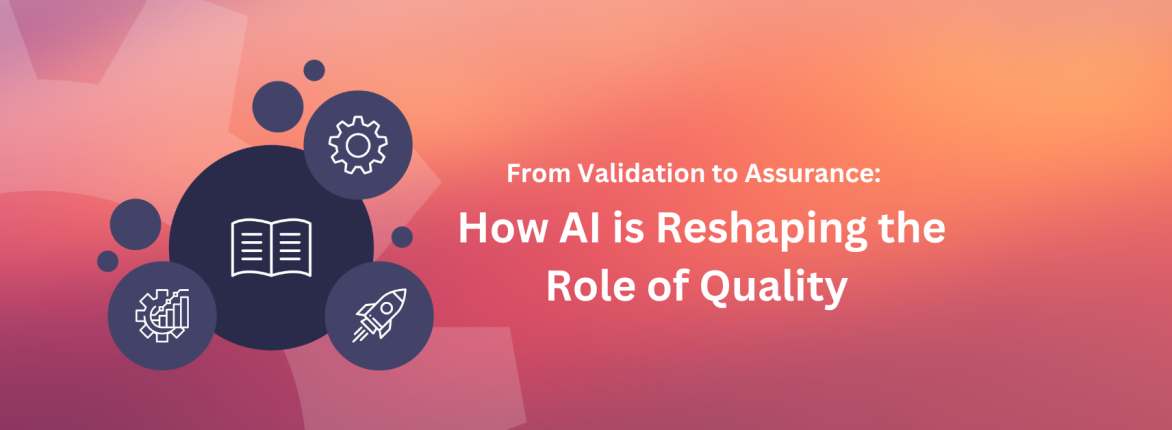The world of software development and testing is undergoing a fundamental transformation, driven in large part by advancements in artificial intelligence (AI). And while AI is already making waves across many industries, the potential of AI in Salesforce Testing and quality lifecycle management — particularly in Salesforce — deployments, is still evolving.
Moving forward, organizations should expect AI to play a vital part in streamlining testing processes, shifting left, and ensuring quality throughout the software development lifecycle. In today’s blog, we’re exploring all things AI in Salesforce automated testing — the future of AI in testing, how generative and predictive AI will shape quality management, and AI’s growing role as a coworker in testing and development.
The Transition from Generative AI to Predictive AI in Test Automation
Many organizations are already leveraging AI for basic automation tasks, including generating test scripts or running predefined test cases. But this is only the beginning! Predictive and generative AI, as well as other more sophisticated AI capabilities, are gaining traction, significantly altering how organizations manage testing, deployment, and quality lifecycle management in platforms like Salesforce.
Generative AI: From Content Creation to Intelligent Test Case Generation
Generative AI, which involves creating new data or content based on patterns learned from existing datasets, is already being utilized for test automation. For instance, generative AI tools can generate new test cases by analyzing application behavior, user interactions, and system architecture. While this technology is still in its early stages, the potential for AI to automatically generate comprehensive test cases will become more refined over the next few years.
In Salesforce environments, generative AI could analyze application features, user stories, and system configurations to autonomously create test scenarios. This would eliminate much of the manual work associated with writing and updating test scripts, allowing organizations to move faster and with greater accuracy. But these capabilities are still emerging and growing. As tools like AI-powered test case generation evolve, organizations will begin to realize more efficient and expansive testing coverage — without the need for manual intervention.
At the leading edge of this evolution is the rise of agentic AI systems — AI that operates with autonomy, goal orientation, and a feedback loop. These agentic systems are not just generating content but making decisions and performing complex tasks end-to-end. In testing, this manifests as autonomous agents that can generate test cases and orchestrate entire testing strategies, adjusting based on system feedback, business risk, or user behavior patterns.
Predictive AI: Anticipating Future Issues and Risks
While generative AI helps create new tests, predictive AI offers a glimpse into the future. Predictive AI uses data from previous releases, user behavior patterns, and system performance metrics to forecast potential issues before they arise. In the next 12–24 months, predictive AI will take on a central role in ensuring Salesforce deployments are risk-free and that issues are identified long before they reach production.
For instance, predictive models will analyze historical test results, defect trends, and code changes to predict where future failures may occur. This will enable businesses to prioritize testing in high-risk areas — such as custom Apex code or third-party integrations — and address potential issues early in the development cycle.
The Hybrid Future of Generative and Predictive AI
There is every reason to believe that within a year or two, a hybrid approach — a combination of generative and predictive AI — will emerge as the gold standard for test automation and quality management. Generative AI will automate the creation of test cases based on new and evolving requirements while predictive AI will forecast future issues and optimize testing coverage to ensure the highest quality across all system components.
For Salesforce platform owners, this means that AI will eventually provide an intelligent testing assistant. These assistants will be able to generate tests and identify critical areas for validation, all while anticipating where new defects are most likely to appear. This level of collaboration between AI and human testers will drastically reduce time to deployment while improving overall system stability.
This vision is now being accelerated by platforms that enable AI systems to test other AI systems. These meta-testing frameworks are crucial in a future where AI is creating, modifying, and deploying code independently. This represents a pivotal shift: AI validating the work of AI, ensuring that automated agents do not compromise quality, security, or business logic in their decision-making processes.
AI as Coworkers in the Testing Process
The idea of AI as a “coworker” is becoming an increasingly important concept to consider. Rather than just being a passive tool used by QA teams, AI will actively participate in the testing and development process. In the next few years, this will become more prevalent, and AI will evolve from performing isolated tasks to being an integral part of continuous testing and quality lifecycle management.
AI-Powered Observability and Continuous Testing
Continuous testing, which integrates testing into every phase of the software development lifecycle, will be a significant focus for AI-powered tools in the coming years. AI will monitor applications and systems in real time, detecting issues and anomalies as they arise. In the context of Salesforce, where frequent changes to custom code, integrations, and configurations are common, AI will help monitor deployments across different environments.
One of the most promising applications of AI in this area is change intelligence, the ability to understand how changes to the system affect other parts of the platform. AI tools will use machine learning to track changes made to Salesforce configurations, custom code, and third-party applications. These AI-powered tools will assess the potential impact of each change, ensuring that the system remains stable and reliable.
This level of observability will shift testing from a periodic task to an ongoing, real-time activity that allows teams to catch problems before they propagate across systems. Predictive AI will be able to flag risky changes and suggest additional testing, while generative AI will automatically create new tests based on these insights.
The integration of agentic systems into observability tools will allow these AIs to autonomously initiate tests, refactor code, or roll back risky deployments, operating with minimal human intervention. Testing and deployment pipelines will no longer require constant manual oversight — agentic AI will both make decisions and take corrective action, ensuring compliance and performance standards are met.
Shifting Left with AI: Catching Issues Early in Development
Perhaps the most significant shift that AI will accelerate is the move toward shift-left testing — a practice that encourages teams to detect and address defects early in the software development process, rather than waiting until the end of the cycle. AI will play an increasingly important role by providing real-time feedback to developers as they write code, enabling them to address potential issues before they become part of the larger system. AI tools will be integrated directly into development environments, offering suggestions on how to improve code quality, security, and performance. This proactive approach will significantly reduce the costs and time involved in fixing defects that are identified late in the development cycle.
Looking ahead, AI agents will move beyond suggestions, becoming autonomous collaborators capable of generating and modifying production-ready code. These AI systems, guided by business goals and quality metrics, will implement changes directly into Salesforce or other platforms. As such, robust testing frameworks must be in place to validate every action taken by AI, ensuring that the outcomes align with user expectations and organizational requirements.
The Future of AI-Driven Test Automation and Quality Lifecycle Management
Looking ahead, the future of AI in test automation and quality lifecycle management will involve a deeper integration of AI into every aspect of the testing and deployment process. In the next 12–24 months, we will see AI become an indispensable tool in change intelligence, test case generation, and real-time observability. By anticipating future risks, improving collaboration between AI and human testers, and automating tasks traditionally handled manually, AI will transform the way businesses approach testing, deployment, and quality assurance.
Organizations that rely on Salesforce will benefit from AI’s ability to shift testing left, continuously monitor system health, and anticipate issues that could disrupt business-critical processes. With the rapid pace of change in Salesforce environments — particularly as businesses integrate new applications and processes into their Salesforce instances — AI will provide the necessary intelligence to ensure high-quality deployments and stable business operations.
Moreover, as AI technologies continue to evolve, they will become more sophisticated, allowing businesses to not only detect and resolve issues faster but also to predict and prevent them altogether. This will enable businesses to maintain high-quality, secure, and reliable systems while reducing the time and cost associated with manual testing and troubleshooting.
Conclusion: A Future Powered by AI in Testing
While there’s still a ways to go, the transition from manual, generative AI to predictive, AI in Salesforce Testing is underway. Within the next year or two, we can expect AI to become an essential part of the test automation and quality lifecycle management process — especially in Salesforce deployments. By harnessing the power of AI to shift testing left, anticipate issues, and continuously monitor system health, businesses will be able to achieve more stable and efficient deployments.
For organizations that use Salesforce, preparing for the future of AI-driven test automation starts today. The advancements in AI technology — including agentic AI, autonomous AI developers, and AI testing AI — will enable businesses to deliver high-quality, reliable solutions faster, with fewer defects, and at a lower cost. The future of AI in testing is bright, and it’s only a matter of time before it becomes an integral part of every organization’s quality management strategy.Ready to learn how Provar can help you transition into our AI-driven future? Book some time with a Provar expert today!



